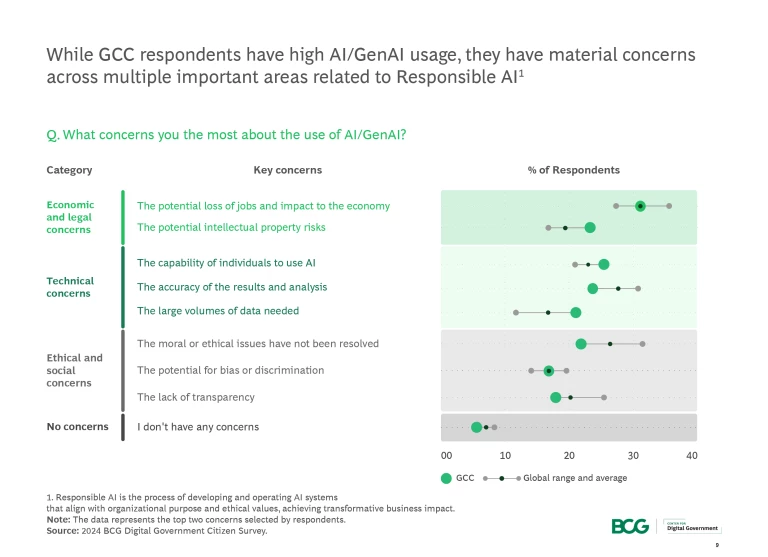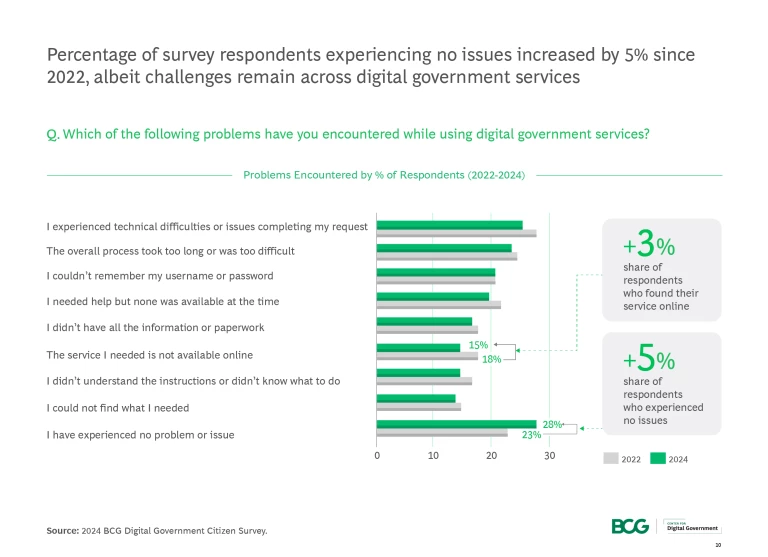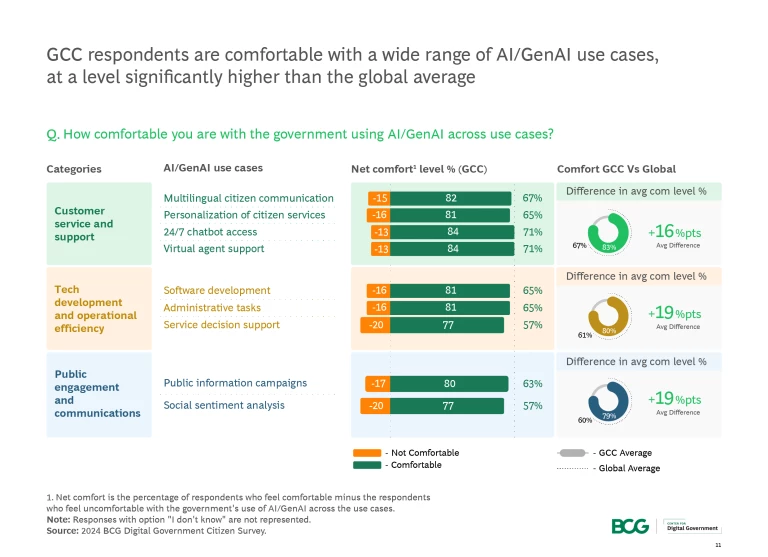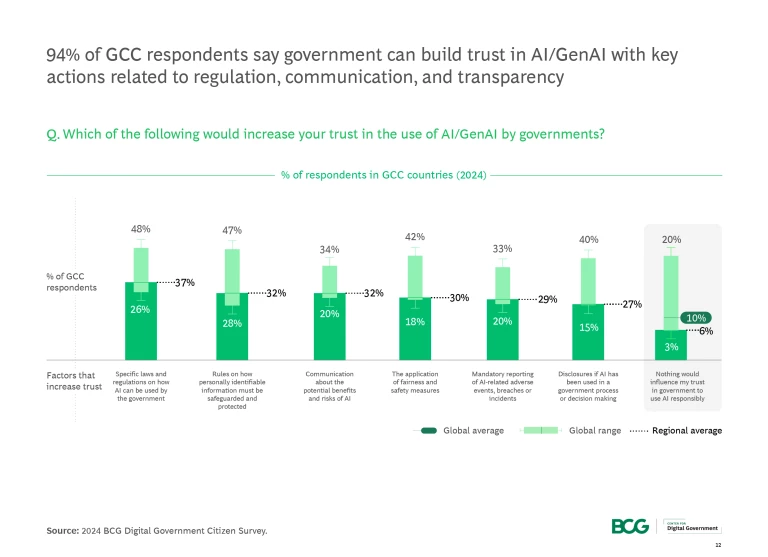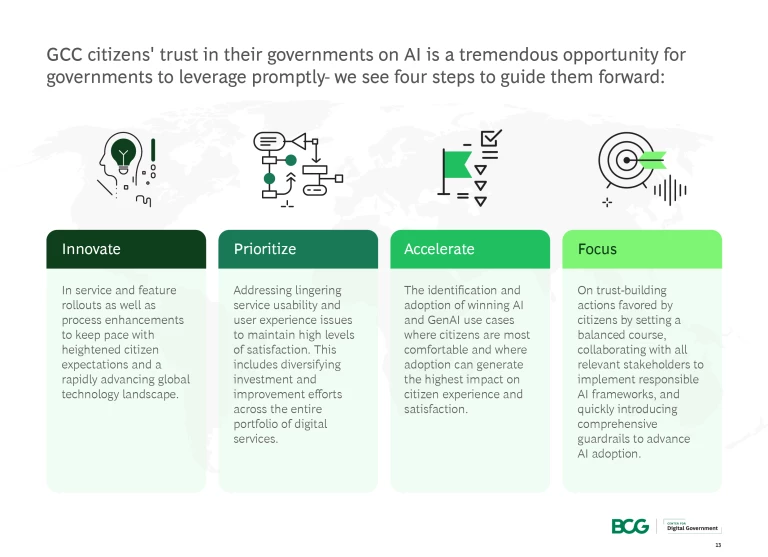The significance of digital government services in addressing citizens’ needs globally cannot be overstated. These services are vital to support individuals through key life events, from registering a birth to healthcare and education to public safety and job support, social assistance and pensions, and more. Digital government services also streamline critical business processes like registering a company, filing taxes, and ensuring regulatory compliance. They are integral to the broader functioning of a nation and its economy, acting as the backbone that ensures societal and economic systems operate smoothly, quickly, and efficiently.
Citizens’ satisfaction with their government services and their experiences accessing them translate quickly into positive overall perceptions of government effectiveness and support. As such, building and operating seamless digital offerings to better serve citizens’ evolving needs should be a key priority for governments and recognized as a core driver of socioeconomic development. Innovation and technological advancements, in this regard, provide governments with vital opportunities to do even better.
This report showcases
About the Digital Government Citizen Survey in GCC
This report focuses on digital government services in the GCC region, with Saudi Arabia (KSA) and the United Arab Emirates (UAE) participating in the survey since its inception and Qatar joining in 2020.
Digital government services include 27 priority high-touch and citizen-facing online services across social services, taxation, housing, health, education, transport, and immigration.
GCC Digital Government Services Lead Globally While Citizen Expectations Are Heightened
Previous surveys have shown that GCC governments receive strong citizen approval for their digital services. This positive trend continued in 2024, as GCC countries maintained their global lead in satisfaction with a net approval

While this year’s survey has reconfirmed cumulative trends from past editions, it has also shown an evolution in citizen expectations. Accelerated digitalization and newer technologies like AI and GenAI (discussed further below) are increasing citizens’ expectations in terms of personalization and improved user experience. This year’s data also highlights a strong link between satisfaction levels and the perception that government digital services are on par with those of the private sector, which are typically best-in-class. This underscores the need for government services to match the efficiency and effectiveness of the private sector while fostering continued innovation in the future.
This year’s survey shows citizens’ increased interest and comparison to leading players in both private and public sectors. For instance, while 42% of GCC respondents (a steady proportion since 2022) expect quality standards similar to those of global digital leaders, including top high-tech private-sector companies, citizen expectations benchmarked to regional private sector companies have seen a 5%pt decline since 2022.
And 23% of GCC respondents (4% higher than 2022) expect quality standards to match those of the best online government services globally, indicating citizens are more aware or global best practices across both private and public sectors.
What Usage and Satisfaction Levels Reveal About GCC Digital Government Services
It is important to note that while citizens expect increasingly higher standards for digital government services, the consistent growth in satisfaction levels in the GCC is reflected in continued widespread usage. Trending upward since 2022, the GCC records the highest usage rates of digital government services globally in 2024 [Exhibit 2]. This overall usage level is a remarkably positive indicator for governments in the GCC. However, examining how both the frequently and less frequently used services perform reveals what is going well and what still needs improvement.

Overall, satisfaction scores of high-usage digital services (see service ranking in exhibit slides) are higher than the average satisfaction across all services in the GCC. This indicates that governments are focusing on improving these more frequently used services with higher repeat value. However, the below-average satisfaction with less frequently used services highlights ongoing or new user experience challenges that require attention. Addressing these gaps, especially in less-used services will reduce the risk of eroding satisfaction and trust (more on this year's UI/UX challenges below).
AI and GenAI Present New Opportunities for GCC Governments
The next generation of digital services for governments will be driven by the newest emerging technologies, including AI and GenAI (see sidebar). These technologies will enable a whole new range of delivery methods and a variety of high-value service use cases, from personalized recommendations and proactive nudges to more advanced chatbots that will make usage easier and more productive
A Quick Brief on (GEN)AI
GenAI: A type of AI that uses foundational, multi-modal models to generate novel content, including text, images, and audio/video, and supports interaction using natural language prompts.
AI has rapidly become a global game changer, rapidly expanding the scale and scope of relevant use cases, and accelerating adoption across organizations. Most interestingly, GenAI has emerged as an important transformational AI technology for direct citizen services. Intuitive GenAI tools like OpenAI’s ChatGPT and Google’s Gemini have seen rapid and widespread adoption around the globe and across industries and users. And just as GenAI is driving productivity and competitive advantage in private-sector customer service, it is also starting to transform digital government service quality and citizens’ experiences.
GCC Public Investment as a Launchpad for AI Leadership
A recent global BCG report estimates that GenAI has the potential to automate
GCC countries have undertaken extensive investment, partnership, and upskilling efforts to leverage this opportunity for government advancement, citizen satisfaction, private-sector growth, and national development. Governments are integrating advanced technologies like AI and IoT into public services while also investing in AI-driven economic development. Saudi Arabia’s National Strategy for Data and AI, which aims to contribute SR 500 billion ($133.3 billion) to GDP by 2030, is focused on developing AI capabilities, data governance, and
https://www.idc.com/getdoc.jsp?containerId=prMETA51181123
Government Investment in AI and GenAI Aligns with Widespread Citizen Adoption
GCC citizens are significantly more familiar with GenAI than those in other regions, as reflected in their higher general usage of GenAI tools [Exhibit 3]. This creates a strong opportunity for GCC governments to accelerate the integration of AI and GenAI into their digital services.

Citizen trust is imperative for governments to successfully leverage AI and GenAI in digital services, especially given GCC citizens’ heightened familiarity with GenAI tools. Without trust, people are less likely to engage with AI-driven solutions or features, squandering many related service improvement opportunities. Interestingly, the data shows a positive link between the quality of digital government services, overall citizen satisfaction, and citizens’ trust in their government to use AI responsibly ( see slide 5 in exhibit slides ).
In GCC countries, which have high citizen satisfaction scores for digital government services, citizens trust their governments even more than private sector entities to use AI responsibly. The net average trust in governments’ responsible use of AI is 71% across GCC countries – 49% higher than the global average – and compared to 52% for the private sector [Exhibit 4]. This trust gives GCC governments the opportunity to rapidly yet safely deploy GenAI to further enhance service efficiency, accessibility, and personalization, thereby fostering even greater trust and satisfaction.
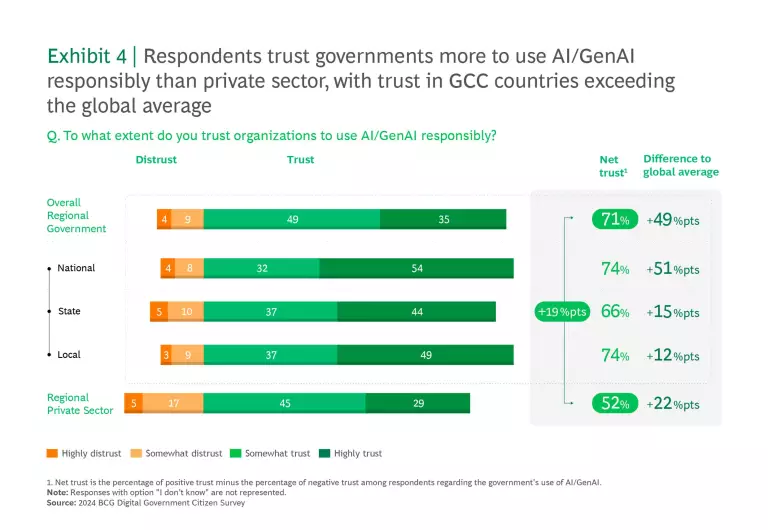
Seizing the GenAI Opportunity While Addressing Potential Challenges
The lightning speed of GenAI’s technological advancement, and its widespread global adoption, come with several challenges. First, governments need to move fast enough to keep up in an effective and responsible way, despite rarely innovating this quickly. For example, BCG’s latest Most Innovative Companies

Second, governments face citizen concerns as they assess their pilot AI and GenAI use cases. In this year’s survey, citizens shared a number of these concerns [Exhibit 5], including potential economic and legal issues. Citizens also cited the need to address technology adoption-related limitations like user capabilities and service accuracy to ensure high-quality outcomes. A further area of notable concern relates to ethical and social issues, including the potential for service bias or discrimination and lack of transparency.
It is therefore important for governments to be discerning in how they use GenAI for productivity and efficiency gains, applying careful consideration and a robust, responsible AI
Citizen Sentiment Remains the Key to Digital Government Service Adoption
Over the past decade, GCC governments have successfully delivered impactful digital services to serve citizen needs, as evidenced by high levels of adoption and satisfaction. Meanwhile, citizens’ expectations continue to increase as the global technology landscape rapidly advances. As with any successful digital product, governments must continue to evolve their services to keep pace with demands for customer-centricity, personalization, and other enhancements enabled by emerging technologies. This presents governments with a twofold challenge.
First, governments must focus on maintaining high levels of citizen satisfaction and trust, finetuning their service features, functionality, and ease of use to enhance citizens’ digital experiences. A comparison with 2022 reveals a 5% improvement in the proportion of respondents who experienced no problems while using digital government services. However, 72% of GCC survey respondents still encounter issues—for example, 26% experienced technical difficulties completing requests, and 24% deemed the overall process too long or difficult [Exhibit 6].

These concerns can be addressed through strategic interventions. For example, further expanding Digital IDentity (DID) efforts simplifies access, eliminates issues like forgotten passwords, and eases navigation between services. GenAI solutions, such as proactive service suggestions, can enhance overall service adoption, while cutting-edge virtual chatbots and dynamic assistance allows for personalized support and effective troubleshooting with 24/7 citizen accessibility.
Distinguishing services based on frequency of use can help governments make informed decisions about where to relatively invest resources for improvement. This strategic approach ensures that governments prioritize areas with the highest impact on citizen satisfaction and service efficiency while ensuring improvement across their entire service portfolio.
Perhaps most importantly going forward, governments should identify top-priority use cases for deploying AI and GenAI solutions. A crucial enabler for GCC governments becoming global leaders in the AI-enabled digital service space is that citizens have shown a globally leading (by a wide margin) level of trust, and they are comfortable with a range of AI use cases in digital government services [Exhibit 7].
For example, GCC respondents are most comfortable with customer support and engagement use cases, with an average comfort level of 83%, which is 16% higher than the global average of 67%. GCC respondents are similarly comfortable with government use of GenAI for tech development and operational efficiency, reporting a 19% higher comfort level than the global average, at 80% compared to 61%. For public relations and communications, the comfort level is 79%, also 19% higher than the global average of 60%. These findings consistently express GCC citizens' greater comfort with AI and GenAI use across multiple areas than their global counterparts.

Governments should also assess pilot use cases for the greatest benefit to citizens' experience and thus the highest return on investment. Behind the scenes, GenAI drives faster code development for technology solutions, enabling quicker updates to meet changing user needs and resulting in more efficient service delivery and reduced administrative wait times. GenAI will also help governments optimize resources through intelligent, focused staffing, where reducing manual intervention in repetitive tasks, for example, can help swift and effective reassignment of roles. BCG estimates that by 2033, GenAI in the public-sector workforce could yield more than $65 billion in annual productivity gains across the
Government AI: A Clear Path Forward
While GCC citizens already report high levels of trust in their governments’ use of AI, there are still risks that need to be addressed. Ongoing efforts to maintain and enhance safeguards and transparency should further bolster citizens’ confidence in AI applications. The survey suggests that there is no single key factor that will drive a significant increase in citizens’ trust in government use of AI, but rather a holistic and studied set of actions, regulations, and initiatives.
As a fairly recent technology, GenAI brings several adoption- and design-related risks. Bias in AI algorithms can perpetuate and even amplify existing inequalities, leading to unfair outcomes for citizens. AI systems can also produce “hallucinations,” generating incorrect or nonsensical information, which can mislead users. The “black box” nature of many GenAI models makes it difficult to understand how decisions are made, reducing transparency and accountability. In providing government services, current GenAI models can struggle with language nuances and context, potentially leading to misunderstandings.

To address these, specific laws and regulations governing AI use can be implemented to provide a clear legal framework that assures citizens of the ethical deployment of AI technologies. When asked which AI regulations and policy considerations would increase their trust, GCC respondents were generally on par with the overall global sentiment.
It is interesting to note that introducing specific laws and regulations on government use of AI and establishing clear rules on how personally identifiable information (PII) is used and protected, were slightly higher on the priority agenda for citizen globally, while gaining 37% and 32% average support respectively from citizens in the GCC [Exhibit 8].
Nonetheless, 30% of GCC citizens believe that applying fairness and safety measures through rigorous testing, and regular AI systems audits, are critical to build trust. Other initiatives around increased transparency, such as open communication on the benefits and risks of AI (30%), mandatory reporting of adverse AI-related incidents (27%), and disclosure of AI use in government process (27%), were of equal importance to citizens in the GCC.
On a closing note, governments today enjoy strong support for responsible AI adoption. Ninety-four percent of respondents in the GCC and 90% of respondents globally believe that implementing at least one of the proposed safety and regulatory measures could increase their trust in government AI adoption.
From Promise to Leadership: How GCC Governments Can Capitalize on Progress
GCC governments have already made remarkable progress in delivering digital services with world-leading levels of adoption and citizen satisfaction. They are well prepared—through supportive national strategies, matching investments, and citizen trust in their ability to do so responsibly—to expand their adoption of AI and GenAI.
Over the years, effective digital service delivery strategies have achieved an 81% net approval score from citizens in the GCC. However, with accelerated global advancements in digital services, especially in AI and GenAI, GCC citizens’ expectations are evolving rapidly. While they continue to benchmark their government services against global private-sector leaders, a notable shift indicates that 98% now expect government digital services to rival the best private and public-sector platforms worldwide. This points to a new era of heightened expectations, which governments must adapt to quickly.
Moreover, the trust GCC citizens place in their governments regarding AI remains an unparalleled opportunity. Their 71% trust level in governments’ responsible use of AI far exceeds global averages. This paves the way for GCC governments to further integrate AI into service delivery, leveraging this trust to introduce transformative next-generation solutions. The challenge now is for governments to act swiftly and responsibly, capitalizing on citizens’ expectations while ensuring the necessary safeguards to maintain and build upon their trust. By doing so, GCC governments can secure their leadership position in the digital public sector landscape in a new responsible AI-enabled era.
We see four steps to guide their path forward:
- Innovate continuously to keep pace with heightened citizen expectations and a rapidly advancing global technology landscape.
- Prioritize addressing lingering service usability and user experience issues to maintain high levels of satisfaction. This includes diversifying investment and improvement efforts across their entire portfolio of digital services.
- Accelerate the identification and adoption of winning AI and GenAI use cases where citizens are most comfortable and where adoption can generate the highest impact on citizen experience and satisfaction.
- Focus on trust-building actions favored by citizens by setting a balanced strategic course, collaborating with all relevant stakeholders to implement responsible AI frameworks, and quickly introducing comprehensive guardrails to advance AI adoption.
The time to take action is now. Tremendous opportunities await the GCC governments that can capitalize on their current digital service momentum, keep pace with AI and other fast-moving technology, thereby exceeding citizen expectations and maintaining their crucial trust overall.










